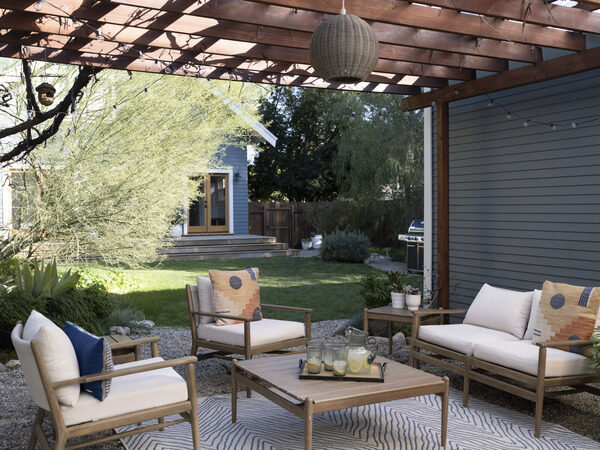
Want an outdoor space to entertain friends and family when the nicer weather comes? Before starting construction, you may want to consider whether a deck or patio is best for your home. Here are some of the factors you’ll want to carefully weigh before making your decision.
What is the difference between a deck and a patio?
A deck is an open outdoor porch or platform that can extend from a house. It’s usually attached to the home and can be built low to the ground or sit above the ground with attached stairs for accessibility.
A patio is a paved area, which can be either attached to or detached from a house. Patios require a relatively flat surface, which is a factor in choosing it versus a deck. Both decks and patios offer a great experience; it’s just a matter of what you’re looking for and what’s best for your space. [1]
What are the different types of decks?
There are a few types of decks to consider before making your decision to build your own:
- Attached deck: The most common type of deck, attached decks are usually designed as an extension of a room and are accessed by doors that allow indoor/outdoor access.
- Wraparound deck: Generally a large, attached deck, that “wraps around” two sides of the house. Wraparound decks can be narrow, spacious, covered or uncovered, depending on your space and budget.
- Detached deck: Freestanding in the yard, detached decks can be elevated or sit close to the ground. They are a good choice for DIYers as they may not require permits and are on the simpler side to build.
- Rooftop deck: A good choice for those with minimal yard space, rooftop decks give an extended living space without taking up room in the backyard.
- Swimming pool deck: If you already have a swimming pool in your backyard, a deck could be a good option to build around it. Using non-slip, low-heat absorbing materials can improve safety around the pool.
- Multilevel deck: For larger properties with changes in elevation, multilevel decks are a series of decks connected by stairs.
Pros and cons of a deck
Building a deck can improve the value of your home, make entertaining friends and family more fun, and add a unique element to everyday life. Let’s take a look at the benefits and drawbacks of building a deck: [2]
Pros of a deck
- Higher resale value: There’s often a decent return on investment for a deck, on average 66% ROI, and frequently the return is better than indoor renovations. [3] You can generally improve your ROI with better materials, such as wood or composite, and extra features, such as a pergola or covering. [4]
- Works well on uneven terrain: Decks can be installed on many types of land, even if your yard is not level.
- Good for a view: Because a deck can be built off the ground, it can often provide a better view, which can increase your home’s value.
- Easily customizable: A wooden deck can be painted or stained to the color or shade to complement your home’s style and appearance.
- Comfortable in the heat: If you live in a warmer climate and your home gets a lot of sunlight, wooden decks naturally absorb and retain less heat.
Cons of a deck
- More maintenance: Depending on the material, decks may need to be power-washed, stained, or sealed every few years.
- Shorter lifespan: Wood is more susceptible to weather and can rot, fade/discolor, and warp if not properly treated.
- Possible permit: Many towns and cities have specific requirements and may require a permit before building a deck because it’s attached to the house and can impact its structure and appearance. Permits may require a fee, a waiting period, and an inspection.
- Cost: While the price depends on the material and size, decks are usually more expensive than a patio of the same size, with an average cost of $30 to $60 per square foot for a professionally-built deck. The average cost to build a deck is about $14,000, with an average range between $9000 and $20,000. If you’re serious about building a deck, get a few estimates from trusted pros in your area. [5]
- Weight restrictions: Consider weight when it comes to the design of your deck, specifically if you want to add a hot tub or outdoor kitchen. Weight is especially important to consider when it comes to raised decks, and it’s another reason that it’s important to get the right permits and inspections throughout the building process.
Pros and cons of a patio
Patios are not only affordable, but they’re also a customizable option that helps transform your outdoor space. Let’s look at the pros and cons of building a patio so you can make a more informed decision.
Pros of a patio
- Less expensive: Generally, building a patio costs much less than a deck of comparable size. According to Angi.com, the average price to build a new patio was about $4,000, but that can vary greatly based on size and materials. [6]
- Easy maintenance: A patio is relatively easy to maintain, as long as you clean it regularly and remove debris. While you may choose to seal your patio, it’s not necessary, because pavers and stone patios tend to be extremely durable.
- More privacy: Patios are usually lay level with the ground, which often makes landscaping for privacy easier than around a raised deck.
- Long lifespan: A quality patio can last many years and maintain its value without much upkeep.
- May not require a permit: Installing a patio doesn’t typically require a building permit or inspections because it typically sits on the ground and doesn’t impact the structure of the home. Make sure to check with the city before starting to build your patio in case you do need a permit or inspection.
Cons of a patio
- Not for uneven terrain: Patios are better suited for even ground. If you build on uneven ground, it can damage your home, ruin the look of your patio and even develop cracks. If the ground in your backyard isn’t level, you can always build a raised patio instead, but this will be an additional cost.
- Prone to cracks: There’s more risk of a patio cracking if the soil under the concrete was not properly prepared. Cracking is also more likely in areas of extreme temperatures. Installing a patio incorrectly can also lead to damage and cracking.
- Slipping risk: In colder areas, ice can easily form on a patio’s surface and raise the risk of falling.
- Susceptible to stains: Since a patio’s surface is exposed to harsh weather, it can be stained with mud, mildew and any other natural materials such as leaves and grass clippings.
If you add a deck or patio to your home, it’s a good idea to make sure you have the necessary property coverage. Learn how a home insurance checkup can ensure that your policy is up to date and help you stay protected.
If you’re still in renovation mode after deciding on an outdoor space, check out 10 more improvements that can add value to your home.
It’s also important to make sure whatever you build is safe in design. Check out this infographic below to view the 5 signs of an unsafe deck.
Sources:
[1] “Decks vs Patios: Cost, Pros, Cons & Comparisons,” decks.com/how-to/articles/decks-vs-patios-cost-pros-cons-comparisons (Accessed Sept. 19, 2023).
[2] “Deck vs. Patio: Which Is Better for Your Home?” angi.com/articles/deck-vs-patio-which-works-better.htm (Accessed Jan. 2024).
[3] “15 Home Improvements That Add Value and Offer a Great Return on Investment,” angi.com/articles/remodeling-projects-highest-roi.htm (Accessed Jan. 2024).
[4] “A Deck Can Boost Your Home’s Value (If You Follow These Rules),” decktec.com/blog/deck-design-tips-trends/a-deck-can-boost-your-homes-value-if-you-follow-these-rules (Accessed Jan. 2024).
[5] “The Cost to Build a Deck in 2023,” nerdwallet.com/article/mortgages/cost-to-build-deck (Accessed Jan. 2024).
[6] “How Much Does a Patio Cost to Build and Install? [2024 Data],” angi.com/articles/how-much-does-it-cost-install-patio.htm (Accessed Jan. 2024).
Disclaimer:
The information included is designed for informational purposes only. It is not legal, tax, financial or any other sort of advice, nor is it a substitute for such advice. The information may not apply to your specific situation. We have tried to make sure the information is accurate, but it could be outdated or even inaccurate in parts. It is the reader’s responsibility to comply with any applicable local, state or federal regulations. Nationwide Mutual Insurance Company, its affiliates and their employees make no warranties about the information nor guarantee of results, and they assume no liability in connection with the information provided. Nationwide, the Nationwide N and Eagle and Nationwide is on your side are service marks of Nationwide Mutual Insurance Company. © 2024 Nationwide



